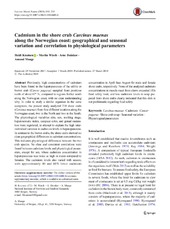| dc.description.abstract | Previously, high concentrations of cadmium have been found in the hepatopancreas of the edible or brown crab (Cancer pagurus) sampled from positions north of about 67° N, compared to regions further south along the Norwegian coast, with no clear understanding why. In order to study a similar organism in the same ecosystem, the present study analyzed 210 shore crabs (Carcinus maenas) from four different locations along the Norwegian coast, two in the North and two in the South. The physiological variables size, sex, molting stage, hepatosomatic index, carapace color, and gonad maturation were registered, in attempt to explain the high inter-individual variation in cadmium levels in hepatopancreas. In contrast to the brown crabs, the shore crabs showed no clear geographical differences in cadmium concentrations. This indicates physiological differences between the two crab species. No clear and consistent correlations were found between cadmium levels and physiological parameters, except for sex, where cadmium concentration in hepatopancreas was twice as high in males compared to females. The cadmium levels also varied with season, with approximately 40 and 60% lower cadmium concentration in April than August for male and female shore crabs, respectively. None of the analyzed cadmium concentrations in muscle meat from claws exceeded EUs food safety limit, and low cadmium levels in soup prepared from shore crabs clearly indicated that this dish is not problematic regarding food safety. | en_US |

